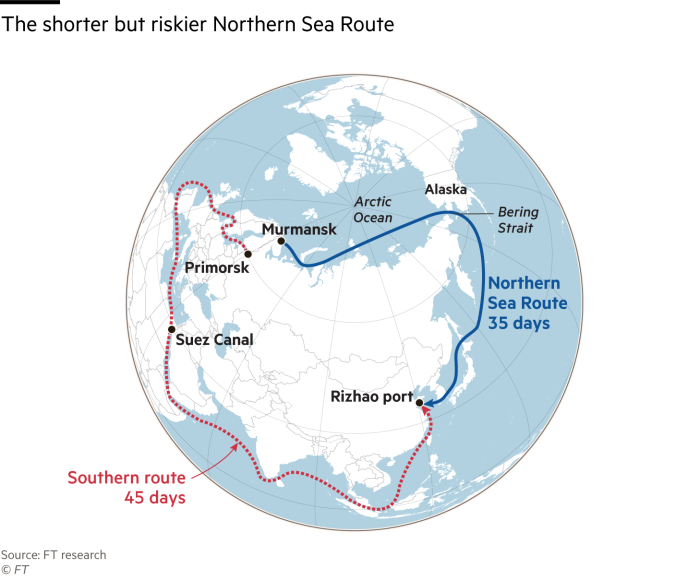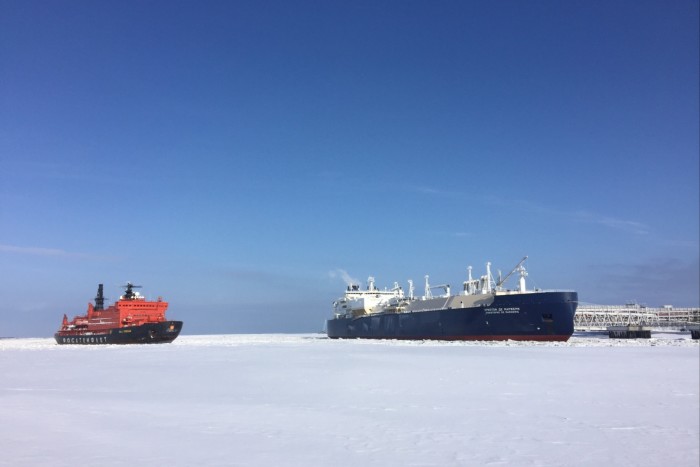Russia has authorized the passage of unreinforced oil tankers through its icy Northern Sea Route, a move that has raised concerns about the potential for a catastrophic Arctic spill. This decision comes as Moscow redirects its energy exports to Asia in response to Western sanctions. Despite not being equipped to withstand icy conditions, two non-“ice class” tankers were permitted in August to navigate the treacherous 3,500-mile journey along Russia’s northern coast, en route to China. Greenpeace UK’s Charlie Kronick has warned that using non-ice-class tankers significantly increases the risk of accidents, given the unpredictable nature of sea ice and the difficulty in maintaining safe routes.
The Northern Sea Route, located within Arctic waters, has been promoted by Moscow as a shorter shipping route to China. The warming climate has made it more accessible during summer months, providing a quicker alternative to the traditional Suez Canal route. Western sanctions, resulting from Russia’s involvement in Ukraine, have compelled Moscow to utilize the Northern Sea Route more frequently in order to reach Asian markets. Compared to the 45-day journey through the Suez Canal, using the northern route can save Russia half a million dollars per voyage solely on fuel expenses.

In 2022, only one tanker, the heavily reinforced Vasily Dinkov, transported Russian crude oil via the Northern Sea Route to China. However, ten ice-class tankers have embarked on the same journey in 2023, according to ship tracking data from Kpler. Additionally, one reinforced LNG tanker successfully completed the voyage this week. Since 2020, non-ice-class vessels have been allowed to sail the route between July and mid-November, either independently or with an icebreaker escort, as per the regulations set by Rosatom, the Russian agency responsible for regulating the Northern Sea Route. Although the navigation conditions are deemed safe during the summer and autumn months, the risks associated with navigating the Northern Sea Route remain substantial, given the potential for ice floes to trap and damage non-reinforced hulls.

© Friedemann Kohler/picture-alliance/dpa/AP Images
Risks associated with ice movement, driven by sea currents and wind, make navigation on the Northern Sea Route highly unpredictable. Less ice can lead to higher waves, creating additional hazards. In July of this year, several ice-class ships encountered unexpectedly challenging sea ice conditions, necessitating the wait for icebreaker escorts in the East Siberian Sea. The use of unreinforced tankers reflects Russia’s desperation to sell its oil, according to Malte Humpert, a reporter with High North News, a publication specializing in Arctic coverage. This situation highlights the intersection between climate change and geopolitics, where Russia prioritizes selling its energy resources over environmental concerns.
Among the two non-ice-class tankers, the NS Bravo is carrying approximately 1 million barrels of oil to the port of Rizhao in eastern China. The Leonid Loza, also transporting the same amount of oil to eastern China, departed from the port of Murmansk on September 9, six days after the NS Bravo, as per satellite ship tracking data. Inspection reports indicate that Russian officials raised safety concerns about the NS Bravo due to insufficient safety precautions and deck corrosion. While contemporary oil tankers utilize double hulls to minimize the risk of spills, there is still a possibility of leaks in the event of hull damage or breach.
Denial of responsibility! Vigour Times is an automatic aggregator of Global media. In each content, the hyperlink to the primary source is specified. All trademarks belong to their rightful owners, and all materials to their authors. For any complaint, please reach us at – [email protected]. We will take necessary action within 24 hours.


